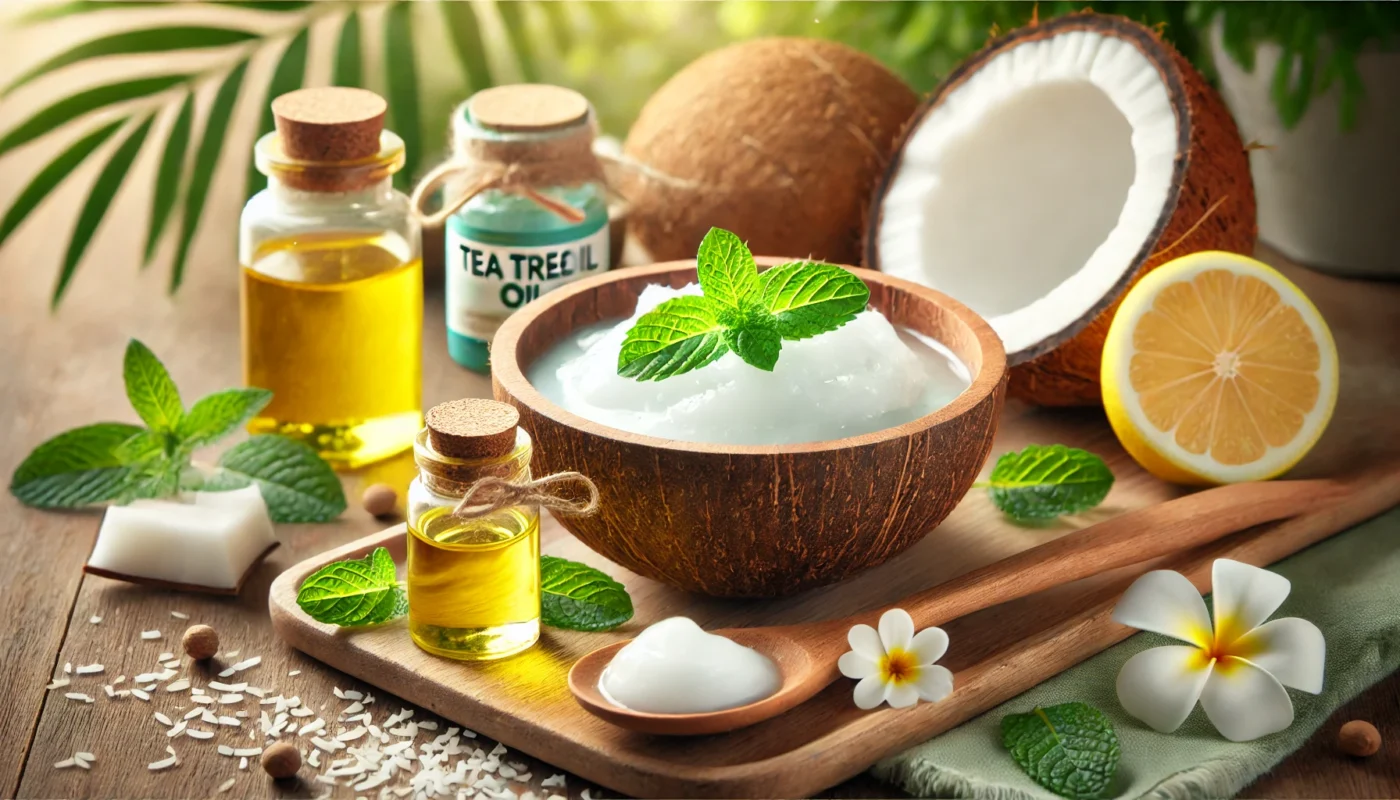In recent years, coconut oil has transcended its traditional culinary uses, emerging as a staple in holistic health practices. With its myriad of benefits, this versatile oil has piqued the interest of researchers and health enthusiasts alike. A significant area of interest is its potential antibacterial properties. But how credible are these claims? Can coconut oil really kill bacteria, and does it possess antibiotic qualities? Let’s delve into the scientific research and practical applications of coconut oil to explore its antibacterial benefits.
You may also like: Home Remedies: Fight Cut Infections Naturally
Understanding Coconut Oil’s Composition
Coconut oil is rich in medium-chain fatty acids (MCFAs), with lauric acid being the most prominent. Lauric acid, which constitutes about 50% of the oil, is known for its antimicrobial properties. When coconut oil is consumed, lauric acid transforms into monolaurin, a compound that has been shown to kill harmful pathogens such as bacteria, viruses, and fungi.
The Role of Medium-Chain Fatty Acids
Medium-chain fatty acids are unique in their structure, making them more easily absorbed and utilized by the body. Unlike long-chain fatty acids, MCFAs are metabolized more quickly, providing a quick source of energy. This rapid metabolism also allows MCFAs to exert their antimicrobial effects efficiently, disrupting the cell membranes of pathogens.
Lauric Acid and Monolaurin: A Potent Duo
Lauric acid is the most abundant MCFA in coconut oil, and its transformation into monolaurin is crucial for its antimicrobial action. Monolaurin has been extensively studied for its ability to combat a range of microorganisms. It can neutralize bacteria and viruses by integrating into their lipid membranes, causing them to break apart.
Other Beneficial Components in Coconut Oil
Beyond lauric acid, coconut oil contains other beneficial components such as caprylic and capric acids. These contribute to the oil’s antimicrobial properties. Caprylic acid, for instance, has been shown to disrupt the cell walls of yeast and fungi, making coconut oil a versatile antimicrobial agent with multiple bioactive compounds working synergistically.
The Science Behind Coconut Oil’s Antibacterial Properties
While coconut oil is not an antibiotic in the conventional sense, it exhibits antimicrobial activity that can mimic some antibiotic effects. Antibiotics typically refer to substances that kill or inhibit the growth of bacteria and are synthesized or derived from microorganisms. Coconut oil, however, is a natural product that can disrupt the lipid membranes of bacteria, leading to their destruction.
Is Coconut Oil an Antibiotic?
Coconut oil’s ability to act like an antibiotic is due to its unique composition. Although it is not synthesized like traditional antibiotics, it can still inhibit bacterial growth. This natural approach can be advantageous, as it reduces the risk of antibiotic resistance, a growing concern in modern medicine.
How Does Coconut Oil Kill Bacteria?
Research indicates that the monolaurin derived from lauric acid can dissolve the lipid bilayer of bacteria, effectively disintegrating the cell membrane. This action compromises the structural integrity of the bacteria, leading to cell lysis and death. Studies have demonstrated its efficacy against various bacteria, including Staphylococcus aureus, a common cause of skin infections and food poisoning.
Comparing Coconut Oil to Conventional Antibiotics
While coconut oil can mimic some effects of antibiotics, it is not a direct substitute. Conventional antibiotics are often more potent and specific in their action. However, coconut oil’s natural antimicrobial properties make it a valuable complementary treatment, potentially reducing reliance on synthetic antibiotics and minimizing side effects associated with their overuse.

Practical Applications of Coconut Oil for Antibacterial Use
Coconut oil’s versatility extends to various practical applications, making it a popular choice for those seeking natural antibacterial solutions. Its ease of use and accessibility have led to its widespread adoption in skincare, oral hygiene, and digestive health.
Topical Applications
One of the most accessible uses of coconut oil is as a topical antibacterial agent. Its application can benefit skin health by reducing bacterial infections. For instance, applying coconut oil to minor cuts and abrasions can prevent bacterial infection and promote healing.
Tip: Clean the affected area thoroughly before applying a thin layer of virgin coconut oil. Cover it with a sterile bandage for optimal results.
Coconut Oil in Skincare Routines
Incorporating coconut oil into daily skincare routines can enhance its benefits. It acts as a moisturizer while providing a protective barrier against environmental bacteria. Using coconut oil as a facial cleanser or makeup remover can also help maintain skin health by reducing bacterial load on the skin’s surface.
Oral Health: Beyond Oil Pulling
Coconut oil pulling is an age-old practice that involves swishing a tablespoon of oil in the mouth for about 10-20 minutes. This method is believed to reduce harmful bacteria in the mouth, thus improving oral hygiene and preventing plaque formation.
Tip: Perform oil pulling in the morning before brushing your teeth. Spit the oil into a trash can to avoid clogging your sink.
Combining Coconut Oil with Other Oral Care Practices
For enhanced oral health benefits, coconut oil can be combined with other natural remedies. Mixing it with baking soda can create a natural toothpaste, while adding essential oils like tea tree oil can boost its antimicrobial effects. These combinations can further support oral health, preventing cavities and gum disease.
Digestive Health
Coconut oil may also support digestive health by combating harmful gut bacteria while preserving beneficial flora. This balance is crucial for maintaining a healthy gut environment, which can enhance nutrient absorption and prevent gastrointestinal disturbances.
Tip: Incorporate coconut oil into your diet by using it as a cooking oil or adding it to smoothies and salads.
Coconut Oil’s Role in Gut Health
The antimicrobial properties of coconut oil extend to the digestive tract, where it can help manage conditions like candida overgrowth. By maintaining a balanced gut microbiome, coconut oil may contribute to improved digestion, reduced inflammation, and enhanced overall gut health.

Coconut Oil and Inflammation
Beyond its antibacterial properties, coconut oil is also noted for its anti-inflammatory effects. The MCFAs in coconut oil can reduce inflammation by modulating oxidative stress and cytokine production. This can be particularly beneficial for individuals with inflammatory conditions such as arthritis or inflammatory bowel disease.
Does Coconut Oil Reduce Inflammation?
Coconut oil’s anti-inflammatory properties are attributed to its ability to reduce oxidative stress. By neutralizing free radicals, it can alleviate inflammation at the cellular level. This property makes it a valuable addition to anti-inflammatory diets, helping manage symptoms of chronic inflammatory conditions.
Tip: Regularly consume coconut oil as part of an anti-inflammatory diet to harness its full benefits.
Coconut Oil in Managing Inflammatory Conditions
For individuals with arthritis or inflammatory bowel disease, incorporating coconut oil into their diet can provide relief. Its anti-inflammatory effects can complement conventional treatments, potentially reducing the need for high doses of anti-inflammatory drugs and minimizing associated side effects.
Enhancing Anti-inflammatory Diets with Coconut Oil
Coconut oil can be a key component of anti-inflammatory diets, which emphasize whole foods and healthy fats. It pairs well with other anti-inflammatory foods like leafy greens, nuts, and fatty fish. By integrating coconut oil into meals, individuals can amplify the diet’s anti-inflammatory effects, promoting overall health and well-being.
Evaluating the Efficacy of Coconut Oil
While the benefits of coconut oil are promising, it’s crucial to approach its use with a balanced perspective. Although it exhibits antibacterial properties, it should not replace conventional antibiotics prescribed by healthcare professionals. Instead, coconut oil can complement traditional treatments and contribute to overall health and wellness.
Scientific Research and Coconut Oil
Several studies support the antimicrobial and anti-inflammatory properties of coconut oil. However, it is important to recognize the limitations of existing research. Most studies are conducted in vitro or on animal models, and more human clinical trials are necessary to establish comprehensive efficacy and safety profiles.
Balancing Enthusiasm with Evidence
While the potential health benefits of coconut oil are exciting, it’s essential to balance enthusiasm with scientific evidence. Consumers should be aware of the limitations of current research and avoid over-relying on coconut oil as a cure-all. Continued research and clinical trials will help clarify its role in health and wellness.
Coconut Oil as a Complementary Therapy
Coconut oil can be a valuable part of a holistic health approach when used as a complementary therapy. By combining it with traditional medical treatments, individuals can optimize their health outcomes. Consulting healthcare professionals ensures that coconut oil is used safely and effectively, without interfering with prescribed medications.

Conclusion: Coconut Oil as Part of a Holistic Health Approach
Incorporating coconut oil into your wellness routine can offer numerous health benefits, thanks to its antibacterial and anti-inflammatory properties. Whether used topically or ingested, coconut oil can be an excellent addition to a holistic health regimen. However, it is essential to use coconut oil as a complementary therapy and consult healthcare professionals for medical conditions or when considering its use alongside conventional treatments.
By understanding the science and practical applications of coconut oil, you can make informed decisions and optimize your health and well-being. Embrace the natural power of coconut oil, and experience its potential as a versatile tool in your health arsenal.
Integrating Coconut Oil into Daily Life
To maximize the benefits of coconut oil, integrate it into your daily routine in various forms. Whether you use it in cooking, skincare, or oral care, consistency is key to experiencing its full potential. Exploring different applications can help you discover the best ways to incorporate coconut oil into your lifestyle.
Consulting Healthcare Professionals
While coconut oil offers numerous health benefits, consulting with healthcare professionals ensures its safe and effective use. They can provide guidance on integrating coconut oil into your diet and health regimen, considering any underlying health conditions or medications.
Embracing a Holistic Health Mindset
Coconut oil exemplifies the potential of natural products in promoting health and wellness. By embracing a holistic health mindset, individuals can explore various natural remedies alongside conventional treatments. This approach fosters a balanced and comprehensive path to achieving optimal health and well-being.
Further Reading:
Antimicrobial Potential of Cocos nucifera (Coconut) Oil on Bacterial Isolates
Treatment of Dermal Infections With Topical Coconut Oil
Coconut oil, anti-inflammatory, health benefits, holistic health, wellness, dietary supplements, chronic inflammation, arthritis, inflammatory bowel disease, natural remedies, healthcare professionals, oxidative stress, free radicals, antimicrobial properties, complementary therapy, healthy fats, whole foods, scientific research, clinical trials, health optimization
Important Note: The information contained in this article is for general informational purposes only, and should not be construed as health or medical advice, nor is it intended to diagnose, prevent, treat, or cure any disease or health condition. Before embarking on any diet, fitness regimen, or program of nutritional supplementation, it is advisable to consult your healthcare professional in order to determine its safety and probable efficacy in terms of your individual state of health.
Regarding Nutritional Supplements Or Other Non-Prescription Health Products: If any nutritional supplements or other non-prescription health products are mentioned in the foregoing article, any claims or statements made about them have not been evaluated by the U.S. Food and Drug Administration, and such nutritional supplements or other health products are not intended to diagnose, treat, cure, or prevent any disease.

